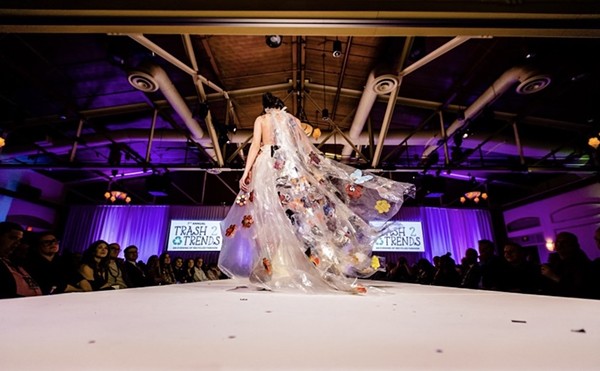In his 1959 drama Sweet Bird of Youth, Tennessee Williams depicted Florida as a breeding ground for Faustian bargains between pathetically self-interested dreamers – a place built on bribes, blackmail and bluster. We can all agree that not much has changed since then, but that doesn't dull the challenge a Sunshine State theater company – currently, Theatre Downtown – faces in making Williams' explosive but wandering text seem more than a geographically correct divertissement. Once you've gotten used to the taped sounds of circling gulls and highway honks that underscore this staging, you need additional reason to remain invested in the story's post-Ponce de Leon, pre-Disney hustlers, whom the script joins as they try to imagineer themselves lives of perpetual glamour and reward.
The die is cast in a Gulf Coast hotel room, where conniving stud Chance Wayne (John Hill) tricks aging screen starlet Alexandra Del Lago (traveling under the name of Princess Kosmonopolis) into patronizing his heretofore underwhelming acting career. The Princess (Nikki Darden), who is fleeing a disastrous comeback attempt, has developed some illicit personal habits that make her an ideal target for extortion. To understand the bargaining clout Chance brings to their nascent relationship, look no further than the casting of Hill's toned torso. Yet there's more to the character than mercenary gigolo-hood: His real aim is not to feather his nest, but to force a reunion with the love of his life, the absurdly but appropriately named Heavenly (Katie Merriman). Complicating matters, Chance has long since run afoul of Heavenly's daddy, Boss Finley, (James Cassidy), an all-powerful politico whose embrace of whites' rights typifies his general interest in maintaining status quos.
As an actor, Hill is both versatile and likable, making our instinctive sympathy for the deluded Chance an emotional tether to hold onto in the midst of the script's ensuing brutalities. Darden, though she seems too young for her role, is a mature talent, possessed of a seemingly infinite repertoire of meaningful line readings, eye movements and other signifiers. But I wish she and director Frank Hilgenberg had pared down her prolific theatrics into a smaller-scale performance that wouldn't have so greatly isolated her from Hill's. To a large extent, Sweet Bird is about the space between people; we're supposed to recognize that Chance and the Princess are alone even when they're alone together. As rendered here, that chasm is simply too great. The dialogue traded by Hill and Darden, for instance, too often sounds like alternating monologues. (Unnecessary, inappropriate soundtrack music makes a few of the legitimate soliloquies ring even more removed and unnatural.)
Other scenes are undermined by an imbalance of ability. Fascinating stage personalities like Cassidy – a proven hand at endowing Williams' villains with nigh-on-Gothic evil – have to play crucial moments opposite co-stars who, to put it politely, are ill equipped to keep up. Still, that doesn't negate our pleasure in watching a Cassidy work, doling out threats of violence in a deep-fried basso profundo that might seem exaggerated to audiences elsewhere but which Floridians know to be 100 percent accurate. And you'll simply be swept off your feet by Peni Lotoza's silky-smooth portrayal of Miss Lucy, Boss Finley's mistreated mistress. An old-school steel magnolia with a soft spot for Chance, she's both totally aware of the womanly influence she possesses and constitutionally predisposed to wield that influence mercifully.
Those attributes may not constitute the sum total of Williams' South – at least eight versions of the play are extant, their respective backstories and denouements conveying varying degrees of pessimism. It's telling, though, that the version Theatre Downtown has elected to present (which elevates Lotoza's Lucy to a sort of spiritual figurehead) maintains a belief that hope can flourish among the outwardly doomed. There's more at stake here than any mere movie career; without intending it, the story's more sympathetic characters are fighting for the idea that even a Dante's Inferno of a Florida backwater can rise above its flaws. So, ultimately, does this show.















